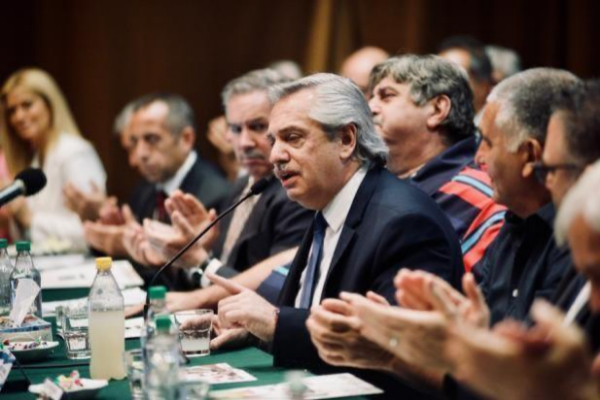- Alberto Fernández, a 37-year-old academic, to the rescue of the Argentine economy
The renewed tangle of taxes and regulations in the Argentine economy threatens Iberia and Air Europa , which dispute the competitive direct flight between Buenos Aires and Madrid with the state-owned Aerolineas Argentinas . If nothing changes, the two Spanish companies will be harmed, because their costs will increase significantly. And the big beneficiary will be Airlines.
The superpower law that the government of the Peronist Alberto Fernández managed to pass days ago includes a 30% tax on foreign currency transactions, either by credit card payments abroad or purchase of foreign currency (dollars, euros, real and any other currency). The goal is that Argentines stop buying dollars or spending them abroad and save in pesos and spend their vacations, which are just beginning now, within their borders. A homeric goal, because Argentines, who largely love traveling abroad, do not believe in weight. They know that it is brutally devalued without warning, experience taught them to save - when they can do it - in dollars, never in the national currency.
"We have to end this practice of saving in dollars," Fernandez said recently, and the phrase was immediately taken as the axis of jokes and irony of all kinds. The great disease of the Argentine economy is that Argentines despise their own currency , Fernandez is right in that, but forcing Argentines to love the peso is for the moment unfeasible. More reasonable, the proposal that the current president received before assuming power on the 10th of this month sounded: to eliminate the peso and create a virtual currency, the Argentine Digital Peso (PAD), which would be administered with a card, would eliminate the evasion and would raise around 80,000 million dollars more per year.
There is no news that the Argentine government will take that path, although it has shown some heterodoxy by opening an email box to receive proposals from institutions and financial advisors on how to renegotiate the foreign debt. While that renegotiation by the young minister Martín Guzmán arrives, the priority is to block the leakage of dollars, either dissuading his purchase or turning it into a very expensive one. The instrument is the "COUNTRY tax (For an Inclusive and Solidarity Argentina)", that extra 30% charged, according to the law, on "the acquisition of services abroad contracted through travel and tourism agencies of the country and the acquisition of passenger transport services destined outside the country, to the extent that for the cancellation of the operation, the Single and Foreign Exchange Market (MULC) must be accessed for the purpose of acquiring the corresponding currencies ".
'Flag airline'
The measure will harm companies such as Iberia, Air Europa, Lufthansa, Alitalia, KLM, British Airways , which connect Argentina with Europe, as well as American Airlines, United, Qatar, Turkish, Emirates, Air New Zealand and other companies, and will clearly benefit Aerolineas Argentinas, a 70-year-old company that is considered the most punctual airline in Latin America and one of the safest in the world. It is also a company with a chronic deficit that the government of Mauricio Macri was decreasing until the succession of mega-devaluations and the pressures of its seven militants made the goal unfeasible.
The new government now wants to "defend" its "flag carrier." He explained to Damián Marsicano , spokesman for Airlines, to EL MUNDO : "We are exempted from the 30% tax, as well as the other airlines that have headquarters in Argentina, which are Fly Bondi, Lan Argentina and Andes. It is not only Airlines that have that competitive advantage, but all those that have a parent company here and do not have to send remittances abroad. "
This is not the case with foreign airlines, including Iberia and Air Europa, which must send profits to their parent companies. Profits in dollars or euros, which means paying 30% more at the time of selling the pesos paid by Argentine customers. That extra cost will inevitably affect the price of tickets, making Spanish flights potentially 30 percent more expensive than those of Airlines, a company that also sells tickets to its customers in Argentina for 12 or even 18 fixed fees in pesos.
Before the consultation of EL MUNDO , Iberia declined to comment, as did Air Europa. All affected sectors are talking with the Argentine Ministry of Economy to try to be exempted from that 30%, but it is highly unlikely that they will succeed. Sources from the Government of Fernández denied EL MUNDO that the new situation is an advantage for Airlines, which between 1990 and 2009 belonged to Iberia, before being recovered by the Government of Cristina Fernández de Kirchner, current vice president of Fernández: "Advantages for Airlines? It is so much that they have discouraged it that it would be little serious to say that these measures can be disadvantageous for foreign companies. Airlines have stopped flying to many places, there one would think that those measures were an advantage for Iberia. "
According to the criteria of The Trust Project
Know more- Iberia
- Mauricio Macri
- Alberto Fernandez
- Cristina Fernández de Kirchner
Argentina The transfer of the presidential baton in Argentina: monarchical airs, vaudeville scenes and witchcraft rites
Interview | Former President of Argentina Eduardo Duhalde: "The extremes have no votes in Argentina"
Latin America The embrace of Mauricio Macri and Alberto Fernández, a "miracle" to unite a polarized country

